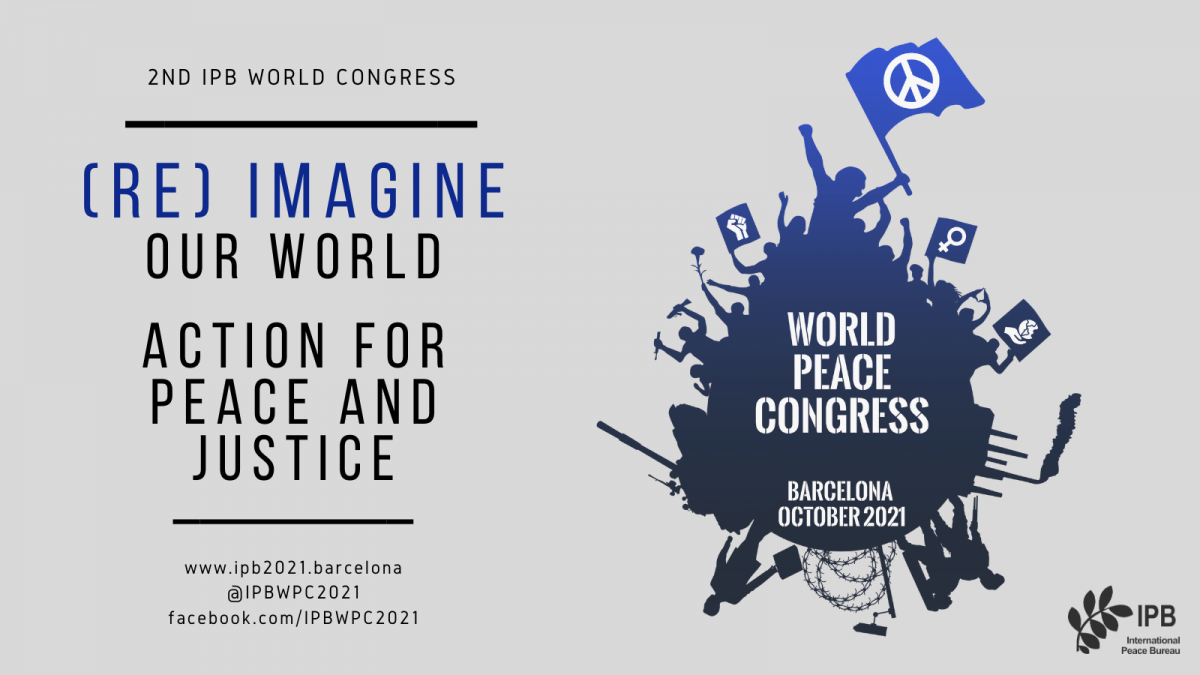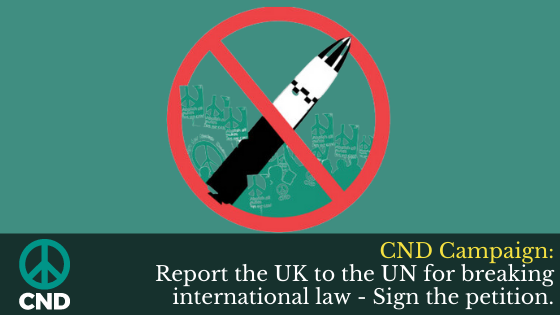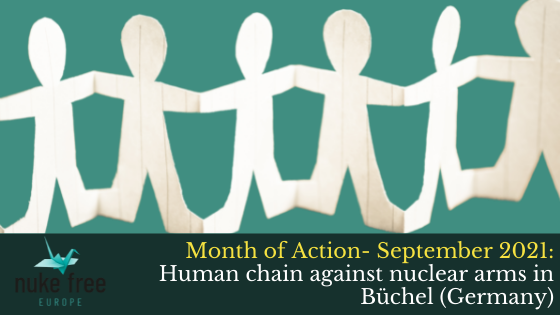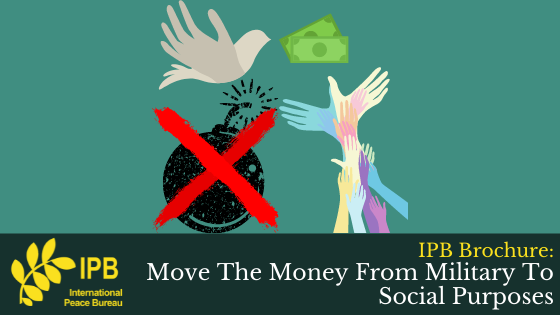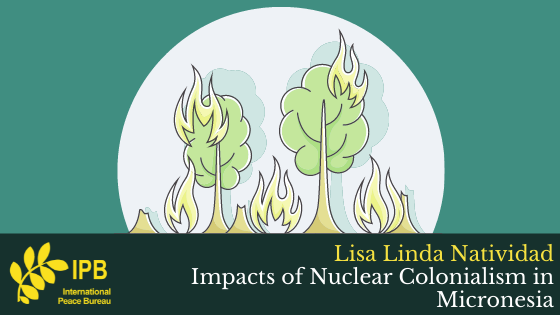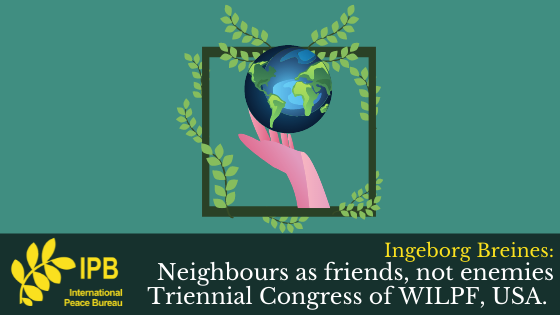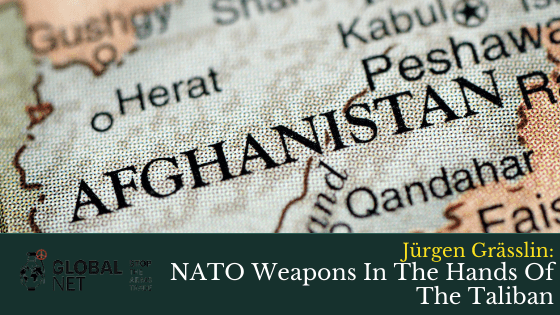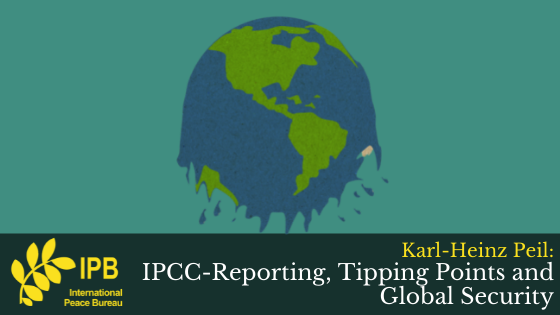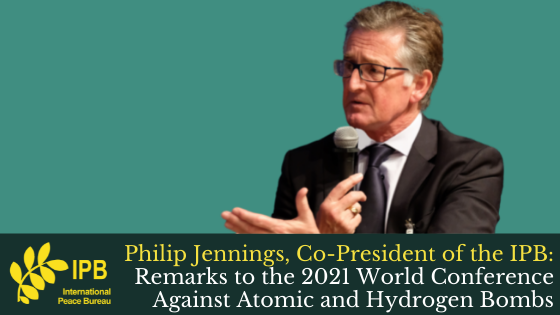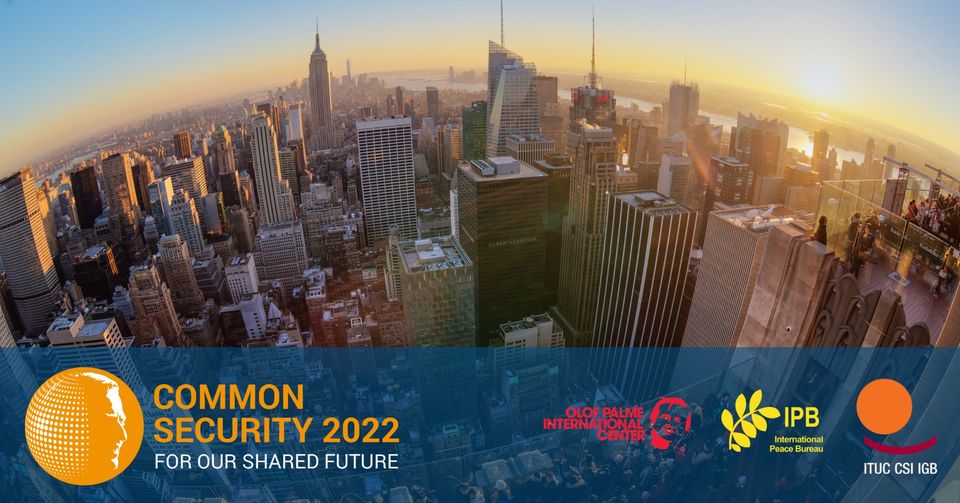IPB has released a new draft of the programme for the World Peace Congress, to be held in Barcelona and online from October 15-17 2021.
News
CND Campaign: Report the UK to the UN for breaking international law
CND is reporting the UK government to the United Nations for breaking international law.
he UK government has announced it will increase the number of nuclear warheads in its arsenal for the first time since the Cold War. A legal opinion commissioned by CND has confirmed this is a breach of international law.
As a signatory to the UN’s nuclear Non-Proliferation Treaty (NPT), the UK has committed to working towards disarmament. Instead, it is going the other way and getting more nuclear weapons, and during a pandemic no less!
CND is reporting the UK to the President-designate of the upcoming NPT Review Conference – a significant international summit to monitor progress, or lack thereof, of the treaty.
If you want to take action, join the initiative and sign here.
Nuke Free Europe: Human chain against nuclear arms in Büchel (Germany)
On Sunday 5 September, the European month of action against nuclear weapons in Europe was kicked off in Büchel, Germany. 800 peace activists formed a human chain to protest against the US nuclear bombs at the Fliegerhorst air base as part of NATO’s nuclear sharing arrangements.
The action took place just weeks before the September 26 federal elections to call on Germany to join the UN nuclear weapons ban (TPNW), which has been in force since January 22, 2021. The peace movement has been campaigning against nuclear arms at the air base for 25 years. The human chain was organized by the campaign “Büchel is everywhere! Nuclear Weapon Free Now”. Continue reading “Nuke Free Europe: Human chain against nuclear arms in Büchel (Germany)”
IPB Brochure: Move The Money From Military To Social Purposes
Based on different reports (e.g. ICAN’s 2021 report, SIPRI Yearbook 2021, the research of the Bulletin of the Atomic Scientists, etc.), the IPB launched the brochure “Move The Money From Military To Social Purposes” in order to provide an overview of the use of nuclear weapons by the World Nuclear Forces. Although the brochure is intended to be informative, the data is used to emphasize the need of reallocating economic resources spent on nuclear weapons development and military to invest them in social
purposes.
To download the brochure click here.
Impacts of Nuclear Colonialism in Micronesia
Article written by Dr. Lisa Linda Natividad on the International Day Against Nuclear Tests.
Empowered by the Treaty on the Prohibition of Nuclear Weapons (TPNW), we celebrate the victory of this work to make the world a safer place and embrace our global humanity. We on Guahan stand in solidarity as we vision and create a peaceful world with genuine security, where people not only have the basic necessities to survive, but everything we need to thrive on this planet. We strive for the protection of our environment, the use of diplomacy for global tensions, and the value of human life so that nuclear weapons will no longer be part of the vocabulary of our children. We stand in solidarity with nuclear survivors, who have suffered from the destruction of nuclear weapons and support their call for a safe and peaceful world. We will continue in our work holding states accountable to the TPNW.
Our communities in Micronesia struggle with environmental contamination and health problems, as well as the loss of our ancestral lands for the development of military bases. We live with the loss of self-determination to make decisions about our communities because the political structures do not take into account our concerns and input about the dangers of living near military bases. We have little access to our traditional fishing grounds and medicines that are behind military fences.
Guahan (Guam) is a territory of the United States located in the Mariana Island chain of Micronesia in the Pacific Ocean. Across Micronesia, the Marshall Islands was the location of nuclear testing in the 1950’s. In the historical period of the Cold War, the United States was involved in the nuclear arms race with the USSR. Nuclear testing entailed the removal of whole islands of people to neighboring locations while the islands of Enewetak, Bikini, Rongelap, and Utrik were bombed to ascertain the destructive force of bombs, as in the case of the H-bomb. Severe physical ailments resulted amongst the Marshallese population, which has resulted in the United States including a provision in the Republic of Marshall Islands Compact of Free Association, Section 177, stating, “The government of the United States accepts responsibility for compensation owing… for loss or damage to property and person of the citizens of the Marshall Islands… resulting from the nuclear testing program…”
An inquiry into the matter as it relates specifically to Guahan resulted in the development of the Blue Ribbon Panel Committee Report on Radioactive Contamination in Guam between 1946 and 1958. In the report, Santos and Forbes stated:
What was perpetrated against this region was the largest ecological disaster in human history. This disaster was no less than the detonation of over 108,000 kilotons of nuclear explosive directly up jet stream of Guam. The amount of contamination was 42 times the approximately 150 million curies released as a result of the testing in the United States of America. The AEC (Atomic Energy Commission) ejected between 6.3 billion and 17 billion and other surrounding regions with various radioactive contamination over a twelve year period, this inundated the region and other surrounding regions with various radioactive isotopes such as Cerium-140, Iodinne-131, Xenon-131, Strontium-90, Yittrium-90, Cesium-137, Barium-137, Potassium-40, Argon-40, Magnesium-24, Hydrogen-3, and Helium-3, all of these products of nuclear tests with a half-life of from four days to thirty years, enough time to reach Guam according to the data provided by and collected in this report.
The findings of the Blue Ribbon Panel Committee Action Report was further confirmed by testimony from Charles Bert Schreiber in 2001, a retired United States Naval lieutenant stationed on Guahan in 1952 in the capacity of Atomic, Biological, and Chemical Warfare Defense Officer. He was primarily responsible for maintaining Geiger counters, which detected and measured alpha particles, beta particles, and gamma rays, which are all know to cause cellular damage to the human body by ionization of radiation. He further shared that readings on his Geiger counter on about November 3, 1952 were extremely elevated with very large amounts of radiation. He shared reporting his findings to his superiors to be told, “that I was to ignore the radioactivity and keep my mouth shut PERIOD. I started to protest, but he told me to leave. I then knew something was very, very wrong. The ‘cover up’ had started.”
Schreiber further reported that the radiation levels in the ecological elements of the island were contaminated. He shared that the rainwater contained high levels, which was the primary source of drinking water for the people of the island. These findings are significant in that rainwater goes on to water the plants, which were consumed by natives. Likewise, ocean water was also contaminated and fish, which was a staple in the indigenous diet, was also exposed to radiation. Earlier this year, Lt. Charles Bert Schreiber returned to the island as the keynote speaker of a prayer vigil in memory of Pacific Islander victims of atomic bomb testing. In an apology to the people of Guahan, he was quoted as saying, “You were not informed of simple precautions that should’ve been taken, resulting in formidable pain and suffering that was intentionally imposed on you.”
US military declassified documents confirmed high levels of radiation (strontium, in particular) recorded on the island in the 1950s. Robert Celestial, President of the Pacific Association of Radiation Survivors (PARS), reported that this millennium is the age of the half-life of such isotopes and the incidences of cancer and other diseases are at greatest risk today. As a result of exposure to nuclear testing fallout, residents of Guahan and others throughout Micronesia are at higher risk for cancer and other diseases. Cancers of the lung, thyroid, breast, esophagus, stomach, and pharynx are examples of the types of cancer that are related to radiation exposure as determined in empirical studies.
We are reminded that peace and justice is central in light of the ongoing issue of nuclear colonialism in Micronesia. Particular emphasis is made on keeping our lands safe and sustainable for our children and generations to come. We are all deeply committed to ensuring the survival of our people in the midst of nuclear colonization. We are very concerned about the safety of our communities and look forward to the realization of global peace free of nuclear weapons and all things nuclear in Micronesia and the whole world!
Neighbours as friends, not enemies
Speech given by Ingeborg Breines, Sigerfjord 21.08.21, during the Triennial Congress of WILPF, USA.
Dear friends.
Thank you for the invitation to briefly present some ongoing efforts to strengthen Nordic- Russian civil society relations and to reflect on whether the time now is ripe to try friendship with Russia, instead of animosity.
I am online with you from some beautiful islands in the north of Norway, way north of the Polar circle, made rather comfortable for living by the touch of the warm Gulf Stream. Norway, as you may now, has a common border with Russian in the extreme north and a negotiated dividing line in the Barents Sea/North Sea, regulating the rich fisheries, especially cod, as well as oil, gas and mineral drilling. This is especially important in a period when interest in the Arctic is growing as climate change opens for more exploitation of natural resources and for transport and traffic in the now partly ice-free North-East Passage. Continue reading “Neighbours as friends, not enemies”
NATO Weapons in the Hands of the Taliban – How the Islamists Were Able to Become the Best-Armed Terror Group in the World
By Jürgen Grässlin for the GLOBAL NET – STOP THE ARMS TRADE (GN-STAT) and ZivilCourage of the DFG-VK
It really could not have been worse: With the seizure of power in Afghanistan, the Taliban have come into possession of a huge arsenal of state-of-the-art NATO weapons. From now on, they will be able to target these weapons at dissidents as well as people with different faiths or beliefs and use them to secure their rule. Continue reading “NATO Weapons in the Hands of the Taliban – How the Islamists Were Able to Become the Best-Armed Terror Group in the World”
IPCC-Reporting, Tipping Points and Global Security
Article written by Karl-Heinz Peil about ‘Code red’, global warming and the risks of a global war.
Already with his message on the New Year in 2018, the UN Secretary-General António Guterres declared: “I am issuing an alert – a red alert for our world”. Perils, including deepening conflicts and new dangers, emerged, and global concerns over nuclear weapons reached the highest since the Cold War, he added. At the same time, impacts of climate change worsened at an alarming rate, inequality increased and horrific violations of human rights were committed.
This year, on August 9th, after the release of the new IPCC report, Guterres said the Working Group’s report was nothing less than “a code red for humanity. The alarm bells are deafening, and the evidence is irrefutable”. The new report was created by 234 authors from 65 countries and considered more than 78,000 review comments. Some people may ask: Did the IPCC working group underestimate global warming against the former Assessment Report in 2014? Continue reading “IPCC-Reporting, Tipping Points and Global Security”
Philip Jennings, Co-President of the IPB: Remarks to the 2021 World Conference Against Atomic and Hydrogen Bombs
August 9,2021. Nagasaki, Japan.
I bring you greetings from the world’s oldest peace organization: the International Peace Bureau.
I bring our respect to the tireless work of the Hibakusha to bring their message of peace to the world. They must be the last people to suffer from nuclear weapons.
My message to you is one of solidarity and hope.
Solidarity with your campaign for a world free of nuclear weapons and solidarity with your appeal that Nagasaki must be the last place on earth where a nuclear weapon is used.
Hope because, with a peace wave of action, we have changed the world, we now have a global treaty that prohibits nuclear weapons.
In this scenario, the Tokyo Olympics have shown how sport can be a force for good. Nevertheless, the existence of Nuclear weapons represents a force for evil placing all human endeavors at risk.
The world is on a wrong and dangerous path. We have reached a tipping point. The doomsday clock is at 100 seconds to midnight. Moreover, Military expenditure surged to 1.9 trillion dollars. 72 billion dollars have been wasted on nuclear weapons each year and spiraling up.
In addition, we are facing new fault lines on old nuclear concerns. Military doctrines are embracing the use of nuclear weapons. As a result, mutual assured destruction is closer and closer.
Strategic cooperation between superpowers sidelined replaced by strategic competition which means a downward spiral of division, polarization, xenophobia. A political narrative that slips into hate, discrimination and encourages relentless military expansion.
We have to demolish the case for strategic competition. It means conflict on all fronts over nuclear, military, land, natural resources, economic and political. It weaponizes diplomacy away from peace to confrontation.
The aggressive language from the G7, NATO, and the Wolf Warrior diplomacy from China is a hammer blow to sustainable peace. It threatens war.
We need sustainable peace in Asia as power shifts, rivalries deepen, the new battlefield for strategic competition. From India to Pakistan, the Korean peninsula, China, the USA, and Russia, nuclear expansion is everywhere.
South China sea military maneuvers, territorial disputes are all tempting conflicts whether from an accident, miscalculation, or misreading of events.
At the IPB we are assembling our members in Asia with the message we want a sustainable peace. The Southern Hemisphere is a nuclear-free zone, the peace movement campaigned for this, it already includes much of Asia. Those in power listened to the people and made the giant step.
Our call: the time has come for a nuclear-free zone for all of Asia.
At this moment let me also express our solidarity with the people of Myanmar who are fighting for their democratic freedoms. We condemn the military dictatorship as we condemn all those that crush human rights in this region. The IPB will not be silenced.
Friends it is time to Re-Imagine our world. That is the theme of our IPB Global Peace Congress that convenes in Barcelona in October.
The responses to the global pandemic, climate crisis, militarization, inequality illustrate not just our lack of preparation but misplaced priorities in a world running away from sustainable peace. Therefore, we must Re-Imagine our world. We have an alternative vision with peace at its cornerstone.
We have helped to the launch of a new Global Commission on Common Security. Together with the Global Trade Union Movement and the Olof Palme Centre in Sweden. Why? It’s because 2022 marks the 40th anniversary of the publication of the Olaf Palme report Common Security: A Blueprint for Survival.
The former Swedish Prime Minister assembled a Global Commission which concluded: “There are no victors in a nuclear war, deterrence cannot be made foolproof, and nations must abandon doctrines and preparation for fighting limited nuclear wars as a matter of deliberate policy”.
The Global Commission was clear: “nuclear deterrence cannot provide a long-term basis for peace, stability, and equity in international society. It must be replaced by the concept of common security”,
Furthermore, they said then and I am sure the new Global Commission will repeat: “The conclusion is therefore inevitable that nuclear weapons must be eliminated”.
We will report in 2022. Our aim is to get the world excited once again about the idea of common security, to put it into practice, to emphasize that collective planetary security rests on our common security.
This is the time to Re-Imagine our world. We must push for nuclear de-escalation. To put brakes on proliferation to reinsert an architecture of control over nuclear weapons.
Russia and the USA have recently reaffirmed that a nuclear war cannot be won and must never be fought – they should go one step further and eliminate their nuclear arsenals. They have launched a strategic stability dialogue. However, the way to achieve stability is by removing thousands of weapons from hair trigger readiness.
The Common Security Commission in 1982 shifted thinking and 2022 aims to do likewise. Help us spark a new debate for common security in Asia.
In conclusion, the campaigning that you have done, the tireless efforts of the Hibakusha from Hiroshima and Nagasaki, messages conveyed across the generations have resulted in a global treaty to prohibit nuclear weapons. 54 nations have already ratified the treaty. Global public opinion is with us. The first meeting of states parties will take place in Vienna in January 2022. The world would welcome Japan signing this treaty before then.
Our struggle continues. We will unite with the new generation, with the climate change and labor movements for with no justice, no green planet there can be no peace.
You will be ready for Vienna.
We will be ready for Barcelona.
Moments of hope, solidarity, and ambition.
The time to Re-imagine our world is upon us.
Let’s deliver.
Click here to download the pdf version of the speech.
Also listen to Philip Jenning’s closing remarks to our Common Security 2022 webinar “100 Seconds to Midnight” and his appeal to collectively ensure that Hiroshima and Nagasaki remain the last cities targeted with nuclear weapons in our history:
Webinar: 100 Seconds to Midnight – How to Handle the Nuclear Threat?
The International Peace Bureau, Olof Palme International Center, and International Trade Union Confederation hereby invite you to join us on Tuesday, 27 July at 13:00 Central European Summer Time for the first digital summit in our Common Security 2022 series.
Continue reading “Webinar: 100 Seconds to Midnight – How to Handle the Nuclear Threat?”

